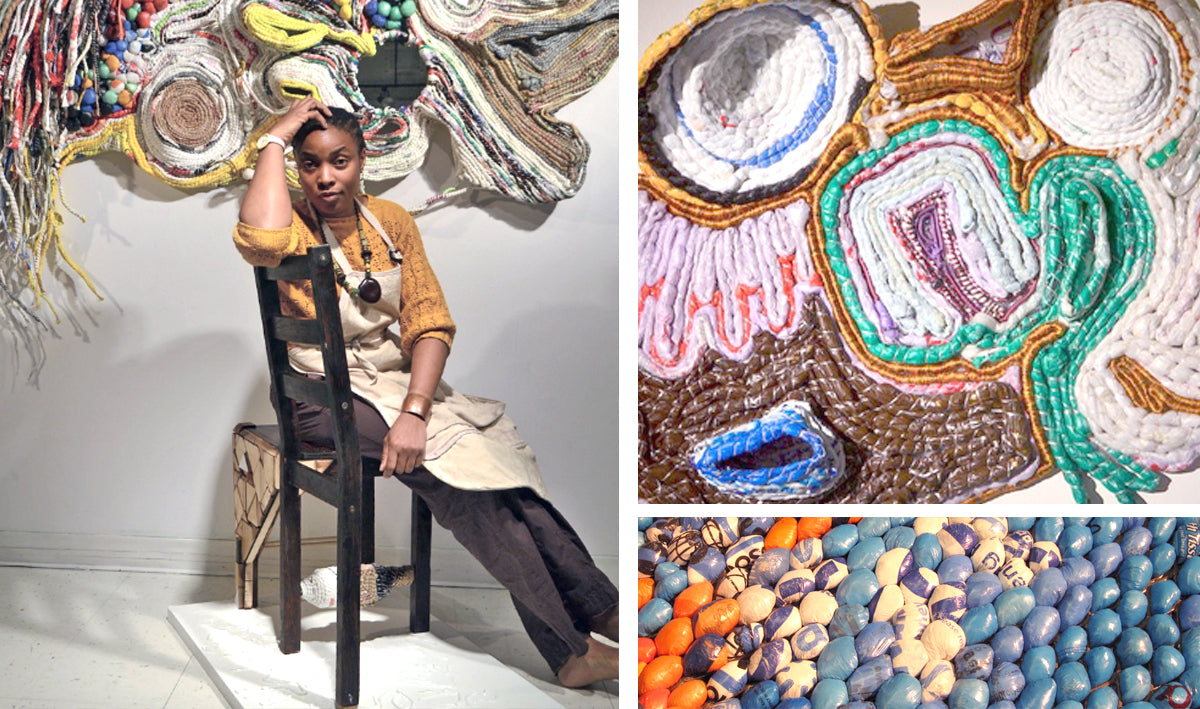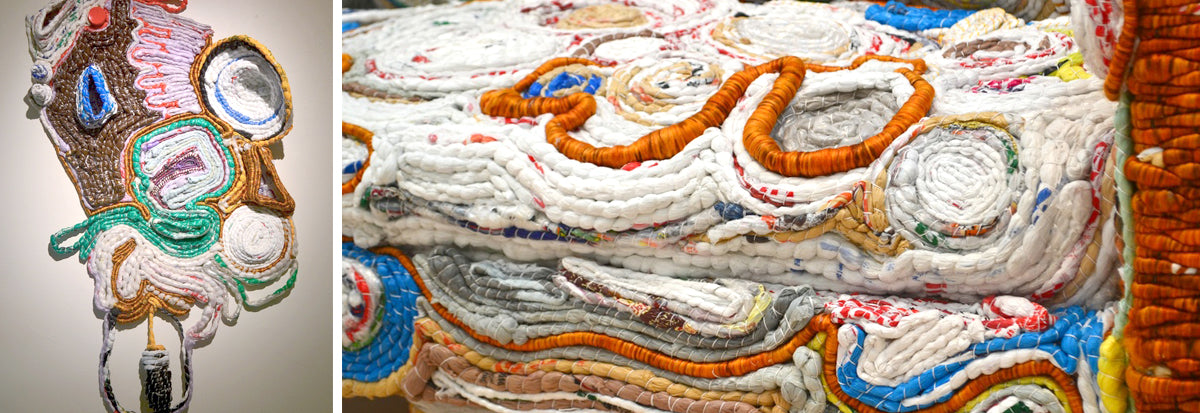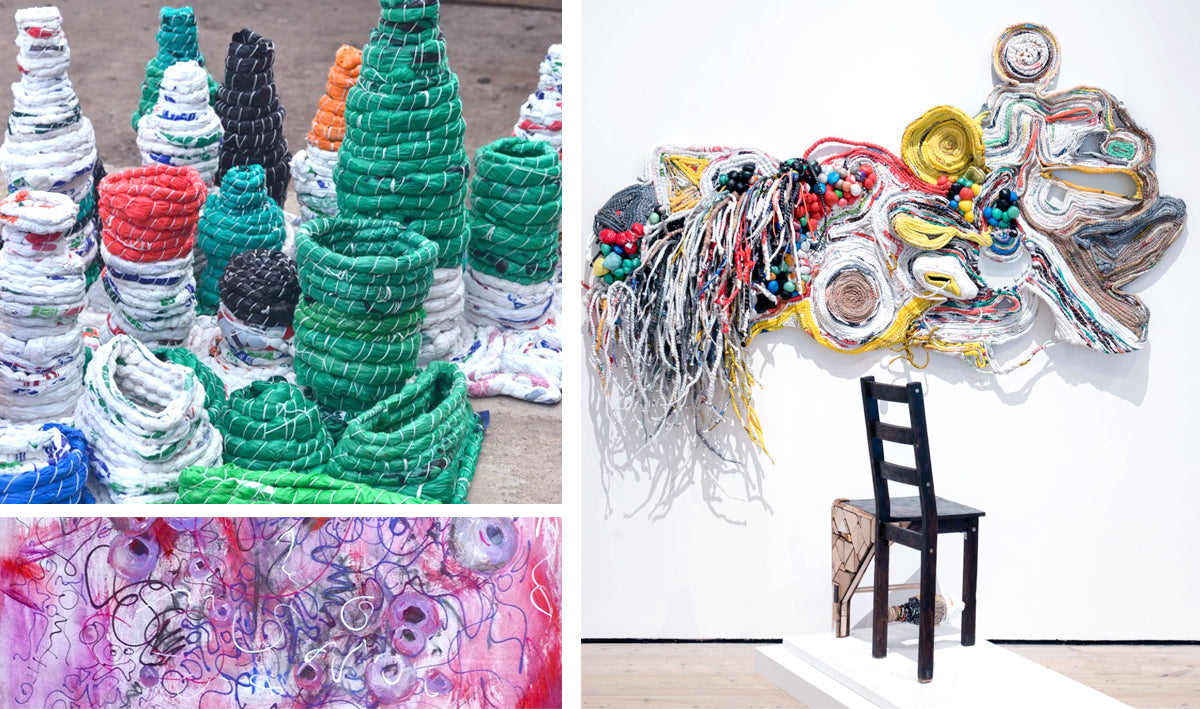


Ifeoma has always had a true passion and love for art, though growing up in a very academic family in Benin City, Nigeria, made her dreams of a creative career tricky. Ifeoma studied Fine Art and Painting at the University of Benin, while at the same time as studying accountancy at the weekends. After graduating with these two very different degrees she applied for banking jobs. only to realise the corporate environment wasn’t for her. With this realisation, she began to look to art full-time, giving her true passion her undivided attention. Through teaching art and inspired by the lack of acceptance in her city of art as a “decent” profession, she decided to dedicate her career to pushing the boundaries as a female artist beyond her training in painting.

Experimenting with traditional handcrafting techniques, Ifeoma creates “non-conventional” 3D art pieces with materials she can find in abundance (waste items like plastic bags). By combining the West African hair-plaiting technique known as Ikpa Owu in Igbo language (Threading) with traditional basketry and weaving techniques, Ifeoma’s plastic experiments led her to develop a technique she describes as “Plasto-Art”. Ifeoma’s inspiration for her Plasto-Art pieces centre around her family life in Nigeria and her West African culture: drawing on folklore, fashion, music and poetry as start points. Story-telling through craft is rooted in her work, having grown up hearing her Grandmother’s great stories of the past. Her tactile weavings make the art pieces look like dense and elaborate embroideries, though their Threading origins run much deeper for Ifeoma.

For us, as Nigerian women, Threading is part of our culture. Hair is very important. It plays a great role in who you are. Hairdressers would create these amazing structures.


Plasto-Art and its environmental impact is fundamental in all of Ifeoma’s artworks. Inspired by her love of Nigeria’s rich craft heritage, it felt natural for Ifeoma to create her art with waste. Nigeria has a great history in repurposing material and utilising waste, though Ifeoma could see that the permanence of plastic was an ongoing issue in her country.
If you’ve eaten fruit you throw away the seed and a tree will grow. When plastic came the natural thing was to throw it on the ground where it would naturally ferment and become manure. This is my understanding of why we throw plastic on the floor.
Creating a connection to her roots, Ifeoma describes the use of plastic bags as honouring her heritage in her “neo-traditionalism” practise. Fusing traditional crafts with found and discarded plastic, she aims to convey that creating art doesn’t mean creating new materials. We love that Ifeoma’s colourful and tactile art pieces use unnatural, non-biodegradable plastics in organic forms, giving waste a new and beautiful lease of life.

For her UK debut solo exhibition “Ezu hu ezu – In(complete)” at the BALTIC Centre for Contemporary Art in Gateshead, Ifeoma carefully curated a selection of her colourful large scale sculptures and installations that were a work-in-progress. She collected local waste plastic bags to weave into some of the exhibited artworks, making the pieces evolve over time. Using this exhibition as a chance to let her art speak of the environmental damage, erosion of traditional crafts and Nigerian culture, Ifeoma describes her work on display as reflecting modern social, environmental and economical issues.
Each work is a moment in time I’ve experienced, or seen or observed that I’m trying to replicate how I felt in that time.

We love the incredible skill, detail and passion behind Ifeoma’s art and wish we could have visited this exhibition last year, so we could have seen her phenomenal sculptures in the flesh. It is so inspiring to find an artist creating art with what we often see as waste, using what would otherwise litter the streets for hundreds of years. The beauty of traditional craft reinvented by Ifeoma in such a modern and moving way resonates so deeply with us. We can’t wait to see where her art will take her next!









pbPauJmNWA
EHcKzxGnCU
Thanks East Heritage for this writing – well articulated. Hopefully I get invited again to show in the UK where this time you will be able to see the works physically .
I am amazed about how beautiful waste plastic can look! What beautiful artwork and what an amazing artist Ifeoma is! Thank you.
I love Ifeoma’s work, thank you.